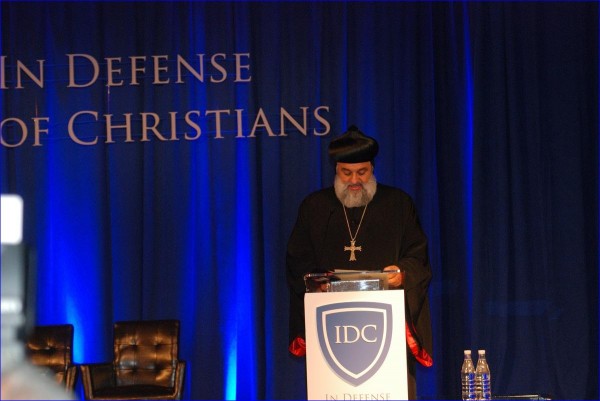Why has the suffering of the Middle Eastern Christian communities not
ignited outrage and support from Western Christians?
The answer has something to do with Israel and the Second Coming, writes Professor Diarmaid MacCulloch.
The answer has something to do with Israel and the Second Coming, writes Professor Diarmaid MacCulloch.
I did my best to honour the Patriarch’s message, and since then, I have written a great deal about silence in Christianity—good silences and also the bad ones, which dishonour Christian faith. It was difficult to fit them all into my book, Silence: A Christian History; and one of the silences which I find most frustrating is precisely the lack of noise from Western Christians about the fate of ancient Christianities in the Middle East. At the heart of the problems in the Middle East is seven decades of unresolved conflict between Israel and Palestine, and I notice that when American politicians discuss those matters, they seem to assume that all Palestinians, and indeed all Arabs, are Muslims. Not so: there are Christians there too, like the Syriac Orthodox Patriarch. They are the first Christians; once they were the future of Christianity, rather than the Churches of the West, Catholics, Protestants or even Orthodox (because those whom we Westerners call Orthodox Christians officially regard most of the Eastern Churches as Unorthodox!). Why this blindness, why this silence?
The problem is a Protestant one, going right back to sixteenth-century Reformation. From Martin Luther onwards, many Protestants have eagerly been awaiting an imminent end to the world, the return of Christ in glory. Reading the Bible, it’s easy to link this to the idea that a necessary precondition for Christ to return is that his ancient people the Jews convert to the Christian faith; and so many Protestants have sought the right conditions for that to happen. It was one of the reasons that the Puritan statesman Oliver Cromwell agreed to the readmission of the Jews to England in the 1650s, after more than three centuries of expulsion; so the English could convert them. But by the nineteenth century there was a further thought: the Jews must return to their Promised Land of Israel. In 1846 there was founded a worldwide Evangelical Alliance. One of its main concerns was to return Jews to Palestine and convert them there; German and British Evangelicals even backed the setting-up of a new Anglican bishopric in Jerusalem to provide for the conversion (the first bishop was indeed a converted Jewish rabbi). This was an unprecedentedly practical attempt to hasten on the Last Days, that recurrent Protestant preoccupation. The Evangelical Alliance found many other battles to fight as new threats to the Evangelical world-view repeatedly emerged, but its first close association with Jerusalem projects was a precocious sign that international Evangelical Protestantism was going to link itself to the fate of the land of Palestine, even before many Jews began to share that concern.

American
Evangelicals made common cause with the Jewish community in the United
States, and they seemed to care little if at all for the opinions or the
sufferings of their fellow-Christians in the ancient Churches of the
Middle East.
Now American Evangelicals made common cause with the Jewish community in the United States, and they seemed to care little if at all for the opinions or the sufferings of their fellow-Christians in the ancient Churches of the Middle East. Israeli politicians have not been slow to exploit this political windfall, caring little for the fact that Evangelical apocalypticism expected the conversion of the Jews to Christianity. American foreign policy has for decades seemed locked into hardly questioning its support for the State of Israel, even though the consequences for its relations with the Arab and Muslim world, and with others, are almost entirely negative. They have been particularly dire for the traditional Christianities of the Middle East. Christian communities were already generally in steep decline in numbers through the region, and Israel/Palestine in particular, even before the present Syrian and Egyptian crises. Caught between the animosities of a politics which has other concerns, Arab Christians have every incentive to leave, whenever they can, for exile in less dangerous lands, ending a connection with homelands which goes directly back to the first generations of the followers of Christ. It is easy for them to feel abandoned and betrayed by the Christian-based cultures of the West.

Join the Christian Coalition for Syria and raise your voice for the voiceless! Syriacs and other Syrian minorities are suffering from vicious assaults by ISIS. They lack adequate military supplies for self-defense, food and water. The refugees who had to abandon their homes need assistance and shelter.
Together we can stand with the Syriacs and other minority groups to ensure their protection and participation in the political process. In order to represent the Syriac people in all platforms, the Syriac National Council of Syria (SNCS) was established on September 8, 2012. This political group has been working for a democratic, civil, pluralistic and multi-ethnic Syria, and has based its policy on comprehensive respect for The Universal Declaration Of Human Rights.
The SNCS has formed a self-defense force - the Syriac Military Council - which works with other self-defense militias to safeguard the lives and property of Syriacs and their neighbors against overwhelming ISIS attacking forces. They include Kurds and other minority militias. As of now, they are in a fierce battle against ISIS forces with overwhelmingly superior weapons and numbers of fighters.............
and sign the petition:-
